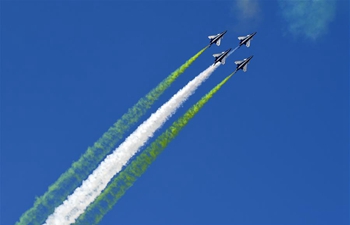WASHINGTON, Oct. 27 (Xinhua) -- U.S. President Donald Trump said on Sunday Islamic State (IS) leader Abu Bakr al-Baghdadi had been killed in a U.S. military operation in Syria. As the Trump administration hailed the death of al-Baghdadi, some experts and former U.S. officials warned that the fight against terrorism is far from over.
Speaking at the White House, Trump said U.S. Special Operations Forces conducted a raid Saturday night targeting al-Baghdadi in northwestern Syria, during which al-Baghdadi killed himself by igniting a suicide vest.
Al-Baghdadi, 48, whose real name was Ibrahim Awad al-Badri, announced the establishment of a caliphate, or the so-called Islamic State, in June 2014.
Over the years, al-Baghdadi has been reported multiple times to have been killed, but none of the reports has been confirmed. In 2016, the U.S. Department of State offered a reward of up to 25 million U.S. dollars for information leading to his capture or death.
"U.S. Special Operations Forces executed a dangerous and daring nighttime raid in northwestern Syria and accomplished their mission in grand style," Trump said.
Trump noted in his remarks that no U.S. personnel were killed in the operation, and the U.S. military obtained "highly sensitive material and information" from the raid.
In his remarks, Trump also expressed his gratitude to Russia, Turkey, Syria, Iraq, and Syrian Kurds, saying the mission could only have taken place with the help of other nations and people.
The death of al-Baghdadi could be a valuable political asset for Trump, who has drawn harsh criticism at home over his decision to withdraw U.S. troops from Syria, in part because it was seen as raising the possibility of the resurgence of the IS.
This operation would allow Trump an opportunity to deny such criticism and take credit for the defeat of the IS, analysts said.
Richard Haass, president of the Council on Foreign Relations, said in a tweet, "The irony of the successful operation against al-Baghdadi is that it could not have happened w/o (without) US forces on the ground that have been pulled out, help from Syrian Kurds who have been betrayed, and support of US intelligence community that has so often been disparaged."
U.S. officials, to a certain extent, attested Haass' tweet. Citing one U.S. official, The New York Times wrote in a Sunday piece that the Syrian and Iraqi Kurds provided more intelligence for the raid than any single country.
During an interview with CNN, U.S. Secretary of Defense Mark Esper said that he did not know if the United States would have been able to carry out the helicopter raid against al-Baghdadi had American troops been completely withdrawn from Syria.
As the Trump administration called the military operation a great success, some experts and former U.S. officials have downplayed the significance of al-Baghdadi's death, arguing that his death would not eliminate the threat of the group.
Michael Smith II, a terrorism analyst at Johns Hopkins University's Global Security Studies program, worried that the killing of al-Baghdadi by the U.S. military might function as a recruitment tool for the IS.
Javed Ali, a former senior director for counterterrorism at the National Security Council, noted that the death of Baghdadi would not lead to a strategic defeat of the IS, which has proved resilient despite its physical loss.
"That's something we learned in the aftermath of the bin Laden raid," he said.
Jennifer Cafarella, research director at the Institute for the Study of War in Washington, also referred to the case of Osama bin Laden. She told The New York Times that al-Qaeda continued to expand globally even after the U.S. military killed the founder and former leader of the terrorist group in 2011.
"Unfortunately, killing leaders does not defeat terrorist organizations," Cafarella said.
Hassan Hassan, a Middle East expert based at the Center for Global Policy, shared a similar view. He predicted that the IS would maintain its foreign affiliates largely intact, and the IS groups in Iraq and Syria would not be demoralized but instead reinvigorated.
James Jeffrey, U.S. special envoy for Syria and the anti-ISIS (the Islamic State) coalition, acknowledged during a congressional hearing last week that more than 100 IS detainees had escaped in north Syria, where the Turkish military operations against the Syrian Kurdish forces took place recently.
Former U.S. Vice President Joe Biden urged the United States to maintain the pressure against the terror group. "That task is particularly important as the chaos of the past few weeks in northern Syria has jeopardized years of hard work and sacrifice by American and Kurdish troops to evict ISIS from its strongholds in Syria," he said in a Sunday statement.
"We cannot afford to get distracted to take our eye off the target," he said.













